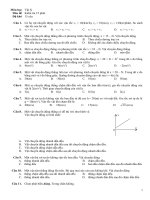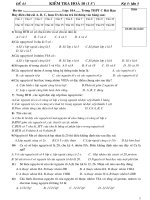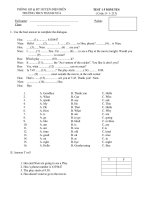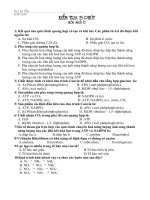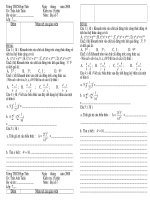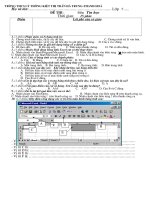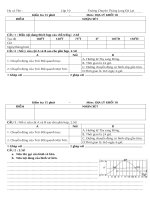kiem tra 15 8
Bạn đang xem bản rút gọn của tài liệu. Xem và tải ngay bản đầy đủ của tài liệu tại đây (153.52 KB, 8 trang )
<span class='text_page_counter'>(1)</span><div class='page_container' data-page=1>
<b>Week 16</b>
<b>Date:</b>
<b>PhRases and clause of reason</b>
<b>I. Grammar</b>
<b>1. Phrase of reason: Because of + N ( NP)/ gerund phrase.</b>
<i>*Note: Because of : is often interchangeable with the expression “ due to”</i>
Eg: Jane was worried because of the rain.
The students arrived late because of the traffic jam.
We have to cut down our driving because of oil shortage.
Because of the rain, we have cancelled the party.
<b>2. Clause of reason</b>
Adverbial clause of reason : Là mệnh đề phụ chỉ lý do hoặc nguyên nhân của hành động
đợc nêu trong mệnh đề chính. Thờng đợc nối với mệnh đề chính nhờ các từ nối : Because/
since/ as ( Since/ As thờng đứng ở đầu câu.
<i>*Form: </i>
<b>Since / As / because + S + V</b>
<b>Eg: He came ten minutes late because he missed the first bus.</b>
(As/ Since he missed the first bus, he came ten minutes late.)
She was worried because it started to rain.
They didn’t take part in the trip because the weather was bad.
<b>* Note: Khi đổi từ mệnh đề sang cụm từ nếu hai chủ ngữ giống nhau -> ta có thể dùng </b>
gerund phrase.
<b>Eg: She stayed at home because she was sick.</b>
-> She stayed at home because of being sick.
<b>II. Exercises</b>
<b>Ex1. Supply either “because” or “ because of”.</b>
1. It was difficult to deliver the letter…… the sender had written the wrong address on the
envelope. => because
2. We decided to leave early …….. the party was boring. -> because
3. Paul may not go to the football game …… his grades. -> because of
4. We have to stay at home …… the heavily rain. -> because of
<b>Ex2: Combine the sentences using “ because/ since/ as”</b>
1. She saw a wanted man in a small shop. She phoned the police.
2. The teacher is sick. We’ll have no class tomorrow.
3. Daisy looks happy. She has just got good marks.
4. It got dark. I couldn’t read the letter.
<i>*Keys</i>
1. She phoned the police because she saw a wanted man.
2. Since The teacher is sick, we’ll have no class tomorrow.
3. Daisy looks happy because she has just got good marks.
4. As it got dark , I couldn’t read the letter.
<b>Ex3: Rewrite sentences using “ because”</b>
1. It’s raining so we stay at home.
2. Most people hear jogging is good exercise, so they begin to jog.
3. The climate in the countryis healthy, so people like to live there.
4. Tomorrow is a public holiday, so all the shops will be shut.
<i>* Keys</i>
1. We stay at home because it’s raining.
</div>
<span class='text_page_counter'>(2)</span><div class='page_container' data-page=2>
4. All the shop will be shut because tomorrow is a public holiday.
<b>Ex4: Change clause of reason to phrase.</b>
1. She went to bed early because she felt sick.
2. John succeeded in his axam because he work hard and methodically.
3. I like him because his mother is kind to me.
4. I can’t eat these fruits because they are green.
5. He came late because it rained heavily.
<i>* Keys</i>
1. She went to bed early because of feeling sick.
2. John succeeded in his exam because of working hard and methodically.
3. I like him because of his mother’s kindness to me.
4. I can’t eat these fruit because of the greenness of the fruits.
5. He came late because of the heavy rain.
<b>Week 17</b>
<b>Date:</b>
<b>Phrase and clause of concession</b>
<b>1. Phrase of concession( sù nh ỵng bé)</b>
<i><b>“</b><b> In spite of / dispite</b><b>”</b><b> ( MỈc dï/ cho dï)</b></i>
<b>In spite of / dispite + sth/ doing sth.</b>
Eg: Despite she shortage, She is beautiful.
Despite his physical handicape, he has become a successful businessman.( khuyÕt tËt)
In spite of her bad grades, Jane will be admitted to the university.
* Mệnh đề “ In spite of / despite” có thể đặt sau mệnh đề chính.
<b>II. Clause of concession</b>
Mệnh đề trạng ngữ chỉ sự nhợng bộ là mệnh đề phụ chỉ sự tơng phản của hai hành động
trong câu. Mệnh đề này thờng băt đầu với những từ nối : Although/ eventhough/ no matter/
whatever ( dù / cho dù)
<i><b>* Structures:</b></i>
<b>1) Although /eventhough/ though/ Much as( MỈc dï) + S + V</b>
Eg: Although the weather was very bad, we had a picnic.
We took many pictures though the sky was cloudy.
2)No matter+ who/what / when/ where/ why(No matter what he says, I don't believe
her.)
<b> How ( adj/ adv)+ S + V( No matter how rich you are, you can never win her heart)</b>
<b> Whatever + N + S + V.( Whatever you said, I don't believe you.)</b>
<b>However(cho dù...thế nào đi chăng nữa)+ Adj/ Adv( However poor they are, they live </b>
happily.)
<b>* Note: Mệnh đề bắt đầu bằng : No matter/ whatever thờng đặt trớc mệnh đề chính.</b>
<i><b>Eg: No matter who you are, I still love you.</b></i>
No matter what she says, I don’t believe her.
Whatever he says, nobody believes him.
Whatever others may say, you are certainly right.
<i><b>Exercise1: combine each pair of sentences below.</b></i>
1. He is very rich. He isn’t happy. ( although)
2. He is very rich. He isn’t happy. ( no matter)
3,4. She can’t answer my question. She is very intelligent. ( although / no matter)
5,6. She says anything. I don’t believe her. ( whatever / no matter)
7,8. He tried. He was not seccessful. ( although/ no matter)
</div>
<span class='text_page_counter'>(3)</span><div class='page_container' data-page=3>
<i>1. Although he is rich, he isn’t happy.</i>
2. No matter how rich he is, he isn’t happy.
3. Although she is very intelligent, she can’t answer my question.
4. No matter how intelligent she is, she can’t answer my question.
5. No matter what she says, I don’t believe her.
6.Whatever she says, I don’t……
7. Although he tried, he wasn’t successful.
8.No matter how hard he tried, he wasn’t successful.
9. No matter what good jobs he got, he wasn’t satisfied.
10. Even though he got good jobs, he wasn’t …..
11. Though it is cold, he didn’t wear warm clothes.
12. No matter how cold it was, he didn’t wear warm clothes.
<b>Clause of condition</b>
<b>1. Type 1: ( real condition)</b>
<b>If clause</b> <b>Main clause</b>
Present simple tense will/ can/ may/ may/ should + V
ex. If we don't leave now, we will miss the train.( đây là điều kiện có khả năng xảy ra
trong tơng lai hay hiện tại.)
<b>2. Type 2: ( unreal in present)</b>
<b>If clause</b> <b>Main clause</b>
Past subjuntive/ past tense would/ could/ might + V
<i><b>ex: If I were you I wouldn’t do that.( tobe: dùng cho tất cả các ngôi.)</b></i>
3. Type 3: ( Unreal in the past)
<b>If clause</b> <b>Main clause</b>
Past perfect would/ could/ might + have + P2
<i><b>ex. If I had worked hard, I wouldn’t have failed the exam last year.</b></i>
<b>4. Unless( = if not)- thờng dùng trong câu điều kiện lo¹i 1.</b>
If clause -> unless
(-) -> (+) , MĐ chính khơng đổi
(+) -> (+) , MĐ chính đổi theo thể ngợc lại.
<i><b>ex. He will be better if he takes morning exercises.</b></i>
-> Unless he takes morning exercises, he won’t be better.
<i><b>Exercise1: Put the verbs in the brackets into the correct tense. </b></i>
1.If I see him, I ( give) her a gift. -> will give
2. If I had a typewriter, I ( type) it myself. -> would type
3. If I ( know) his phone number, I would give it to you. -> knew
4. I shouldn’t have believed it if I (not /see) it with my own eyes. -> hadn’t seen
5. If she had asked you, you ( accept)? -> would you have accepted?
6. Rice plants ( grow) well if there is enough rain. -> will grow
7. He may be late if he ( not/ hurry). -> doesn’t hurry
8. Tell him ( ring) me if you (see) him. -> to ring/ see
9. If I tell you a secret, you ( promise) not to tell it to anyone else? -> will you promise
10. If you ( be/not) careful, you’ll cut yourself with that knife. -> aren’t
<i><b>Ex2: Use unless instead of if</b></i>
1. If you don’t like this one, I’ll bring you another.
=> I won't bring you another unless you like this one.
2. If we had more rain, our crops would be better.
</div>
<span class='text_page_counter'>(4)</span><div class='page_container' data-page=4>
3. If you don’t study hard, you won’t pass the exam.
=> You won't pass the exam unless you study hard.
4. If I have time, I will help him. => I won't help him unless I have time.
<b>Week 18</b>
<b>Date:</b>
<b>Revision reported speech</b>
<b>1. Têng tht c¶m xóc.</b>
- động từ tờng thuật + with + N
- động từ tờng thuật + adv.
ex. '' Hurrah! I've passed the exam!''
=> He exclaimed with joy that he had passed the exam.
He exclaimed joyfully/ happily/ cheerfully that he had passed the exam.
<b>2. Tờng thuật hành động lời nói.</b>
<b>a) Têng tht lêi trÇn thuËt:</b>
<i><b>- admit that: (thó nhËn r»ng)</b></i>
ex. '' It was me who took the money'' => He admitted that he had taken the money.
<i><b>- answer that/ reply that( tr¶ lêi r»ng )</b></i>
ex. '' Did you go out last night?'' she said.- '' No'' he answer.
=> She asked if he had gone out the night before. He answered that he hadn't.
<i><b>- argue that:( tranh c·i r»ng) </b></i>
ex.'' A cat isnot strong enough to open the fridge'' - he said.
=> He argued that a cat wasn't strong enogh to open the fridge.
<i><b>- claim that( cho r»ng)</b></i>
ex.'' I've done it right''- he said.=> He claimed that he had done it right.
<i><b>- complain that( phµn nµn r»ng) </b></i>
ex. '' You've never taken me out since we got married'', his wife said.
=> His wife complained that he had never taken her out since they got married.
<i><b>- accuse sb of doing sth:( buéc téi ai làm gì )</b></i>
ex. '' You've copied my essay.''- his friend said.
=> His friend accused him of copying his essay.
<i><b>- deny that/ V-ing: ( chèi r»ng)</b></i>
ex. '' You've taken my phone.'', his friend said - '' I didn't'' , he said.
=>He denied taking his phone./ His friend accused him of taking the phone but he denied
it.
- apologize for doing sth:
ex. '' I'm sorry I'm late.'', he said. => He apologized for being late.
<i><b>- agree to do sth: đồng ý làm gì</b></i>
<i><b>- offer to do sth: tình nguyện làm gì</b></i>
<i><b>- insist on doing sth: cố địi làm gì</b></i>
<i><b>- promise that/ promise to do sth: høa r»ng</b></i>
<i><b>- refuse to do sth: từ chối làm gì</b></i>
<i><b>- threaten to do sth: doạ làm gì</b></i>
<i><b>- assure somebody that: bo m vi ai rng</b></i>
<i><b>- object that: phản đối rằng</b></i>
<i><b>- explain( to sb) that: gi¶i thÝch (víi ai) r»ng</b></i>
<i><b>- remark that: nhËn xÐt r»ng</b></i>
<i><b>- state that: ph¸t biĨu r»ng</b></i>
<i><b>- reported that: têng tht r»ng/ b¸o c¸o r»ng</b></i>
- remind sb that/ remind sb to do sth
- opologize for doing sth
<b>b)Tờng thuật lời yêu cầu:</b>
</div>
<span class='text_page_counter'>(5)</span><div class='page_container' data-page=5>
- urge sb to do sth: thóc giơc ai lµm g×
- encourage sb to do sth: khuyến khích, động viên ai làm gì
- advise sb to do sth: khuyên ai làm gì
- warn sb( not) to do sth: cảnh báo ai đừng làm gì
<b>Exercise 1: Rewrite each sentence in reported speech, beginning as shown.</b>
1) '' I wouldn't cook the fish for too long, if I were you.'', said Jean.
- Jean advised...( me not to cook the fish for too long)...
2)'' Helen, would you like to come over for lunch on Sunday?''- said Mary.
- Mary invited...( Helen to come over for lunch on Sunday).
3)'' Don't forget to take a short rest every two hours, will you?''- she said.
- She reminded...(me to take a short rest every two hours)...
4) '' Why don't you take a holiday?''- said the doctor.
- The doctor advised...( me to take a holiday)...
5) '' No, you really must stay for the night, Sophia''- Ann said.
- Ann insisted..(that Sophia stay for the night).../ had to stay for the night...
6) '' Well, in the end I think I'll take the brown pair''- said the customer.
- The customer finally.( decided to take the brown pair)...
7) '' Give us your key or we'll kill you all'', - said the robbers.
- The robbers theatened...( to kill us all if we didn't give them our key)...
8) '' Would you mind getting out of the car?'' - the driver said to me.'' I have to change a
wheel.''=> The driver asked..( me to get out of the car and explained that he had to change
a wheel...
9) '' Ok. It was my mistake. I'm sorry''- Paul said.
- Paul admitted..(that it was his mistake and apologized)...
10)'' Shall I lend you some money?- said Peter.
- Peter offered..( to lend me some money)...
<b>Week 19</b>
<b>Date: </b>
<b>Passive voice</b>
<b>A. Grammar</b>
* Khi ta không chú trọng đến chủ thể gây ra hành động mà chỉ để ý đến kết quả của hành
động ấy-> dùng dạng bị động.
<b>Active</b> <b>Passive</b>
<i><b>1. Present simple</b></i>
S + V + O
<i><b>2. Past simple</b></i>
S + V- ed + O
<i><b>3. Present continuous</b></i>
S + is/ are/ am + V- ing + O
<i><b>4. Past continuous</b></i>
S + were/ was + V- ing + O
<i><b>5.Present perfect</b></i>
S + has/ have + PP + O
<i><b>6. Future & Modal verbs</b></i>
will/ shall
can
may
S + must + V+ O
have to/ has to
ought to
be going to
used to
*S + is/ am/ are + PP + by + O
*S + was/ were + PP + by + O
* S + is/ am/ are + being + PP + by + O
* S + was/ were + being +PP + by + O
* S + has/ have + been + PP + by + O
* S + will/ shall + be + PP + by + O
can
</div>
<span class='text_page_counter'>(6)</span><div class='page_container' data-page=6>
……
* Note: “By” đứng trớc trạng ngữ chỉ thời gian và đứng dau trạng từ chỉ nơi chốn.
Ex: A car is going to be bought by her mother tomorrow.
He was found in the forest by the police.
<b>B.Exercises</b>
<i><b>Ex1: Rewrite the sentences in the passive voice:</b></i>
1.They can’t make tea with cold water.
2. Someone has taken some of my books away.
3. They will hold the meeting before MayDay.
4. They have to repair the engine of the car.
5. The boy broke the window and took away some pictures.
6. People spend a lot of money on advertising everyday.
7.They may use this room for the class.
8. The teacher is going to tell a story.
9. Mary is cutting the cake with a sharp knife.
10. They have provided the victims with food and clothing.
11. People speak English all over the world.
12. You must clean the wall before you paint it.
13. They told the new student where to sit.
14. She was reading a book at 6 am yesterday.
15. He used to visit his grandparents at weekend.
16. Smoke filled the room.
17. Someone will tell him that news.
18.John delivers the newspapers everyday.
19. He is asking me a lot of questions
20.My friend can answer this question.
<i><b>Ex 2: Rewrite the sentences in active.</b></i>
1.These exercises were done well. -> They did these exercises well.
2. This dress must be washed in cold water. -> They must wash this dress in cold..
3. This house was built 100 years ago. -> They built that house …..
4. These artifical flowers are made of silk. -> They make these artificial flowers..
5. The lessons are being written by the students now. -> The students are writing….
6. The animals at the zoo are fed twice a day. -> Someone feeds ………
7. How are candles made? -> How do they make candles?
8. It is believed that red is the symbol of luck. -> People believe that red ….
9. What have been done to help the poor in this city? -> What have they/you done to ….?
10.The house will be built by them next years. -> They will build the house ….
<b>Keys- Ex1:</b>
1. Tea can’t made with cold water. 11. English is spoken……
2. Some of books have been taken away. 12. The wall must be cleaned…
3. The meeting will be held before May Day. 13. The new student was told…
4. The engine of the car has to be repaired.... 14. A book was being read…
5. The … was broken … some pictures were .. 15. His grandparents used to be..
6. A lot of money is spent on…. 16. The room was filled….
</div>
<span class='text_page_counter'>(7)</span><div class='page_container' data-page=7>
10. The victims have been provided with 20. This question can be answered..
<b>Week 20</b>
<b>Date:</b>
<b>Would rather/ Prefer/ Have sth done/</b>
<b>As if/ It's time/ Used to/ Had better/ Suggest</b>
<b>1) Had better do sth/ not do sth.</b>
ex. You'd better go there alone.( Bạn nên tới đó một mình)
<b>2) Used to do sth( Thờng làm gì trong quá khứ)</b>
Be( Get) used to doing sth. ( Quen với việc làm gì)
3) Prefer to do / doing sth( Thích làm gì- Chỉ sở thích nói chung)
* Prefer sth to sth:( Thích cái gì hơn cái gì)
* Prefer doing sth to doing sth:( Thích làm việc gì hơn làm việc gì)
* Would prefer to do sth:( Muốn làm gì)
* Would prefer sb to do sth/ not to do sth.( Muốn ai đó làm gì)
4) Would rather
* Would rather do sth than do sth:( Thích làm gì hơn làm gì)
* Would rather do sth/ not do sth( Muốn/ không muốn làm gì)
* would rather sb did sth/ didn't do sth( Muốn/ không muốn ai làm gì- Trái với thùc tÕ ë
hiƯn t¹i)
5) It's time
</div>
<span class='text_page_counter'>(8)</span><div class='page_container' data-page=8></div>
<!--links-->
